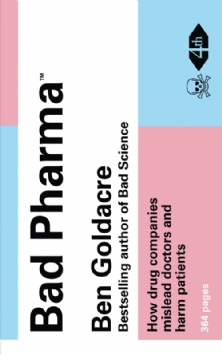Bad Pharma
Bad Pharma: How Drug Companies Mislead Doctors and Harm Patients is a book by Ben Goldacre, published in 2012, that criticizes the pharmaceutical industry for its practices in research, its influence on the practice of medicine, and the extent to which it controls academic research and publication. The book is a follow-up to Goldacre's earlier work, Bad Science, and extends his critique of the scientific and medical establishment to the global pharmaceutical industry.
Summary[edit | edit source]
Bad Pharma outlines several key issues within the pharmaceutical industry, including the selective publication of clinical trials, the manipulation of trial results, the misuse of statistics, the influence of drug marketing on medical practices, and the significant problems in the regulation of drugs. Goldacre argues that these practices lead to the use of inferior or unnecessary medications, causing harm to patients and an increase in healthcare costs.
Selective Publication and Trial Manipulation[edit | edit source]
One of the central themes of Bad Pharma is the selective publication of positive trial results and the suppression of negative ones. Goldacre highlights how this practice, often referred to as publication bias, can skew the medical literature and mislead doctors about the effectiveness of treatments. He also discusses how some pharmaceutical companies manipulate trial methodologies or data to produce more favorable outcomes.
Marketing Influence[edit | edit source]
The book delves into the tactics used by drug companies to market their products to doctors, including the provision of free samples, sponsorship of educational events, and the employment of sales representatives who may provide biased information. Goldacre argues that these marketing strategies can influence prescribing behavior to favor newer, more expensive drugs that may not be more effective than existing treatments.
Regulatory Issues[edit | edit source]
Bad Pharma also examines the role of regulatory bodies, such as the Food and Drug Administration (FDA) in the United States and the European Medicines Agency (EMA) in Europe. Goldacre criticizes these organizations for allowing pharmaceutical companies too much control over the testing and approval of their own products. He suggests that this can lead to a conflict of interest and may compromise patient safety.
Reception[edit | edit source]
The book received widespread attention and sparked debate upon its release. It was praised for shedding light on the problematic practices within the pharmaceutical industry and for advocating for more transparency and integrity in medical research. However, some critics argued that Goldacre's portrayal of the industry was overly negative and did not fully acknowledge the complexities involved in drug development and regulation.
Impact[edit | edit source]
Following the publication of Bad Pharma, there has been increased discussion about the need for reform in the pharmaceutical industry. Some of Goldacre's recommendations, such as the registration of all clinical trials and the full publication of trial data, have gained support among researchers, policymakers, and advocacy groups. The book has contributed to ongoing debates about how to ensure that medical treatments are safe, effective, and based on the best available evidence.
See Also[edit | edit source]
Search WikiMD
Ad.Tired of being Overweight? Try W8MD's physician weight loss program.
Semaglutide (Ozempic / Wegovy and Tirzepatide (Mounjaro / Zepbound) available.
Advertise on WikiMD
|
WikiMD's Wellness Encyclopedia |
| Let Food Be Thy Medicine Medicine Thy Food - Hippocrates |
Translate this page: - East Asian
中文,
日本,
한국어,
South Asian
हिन्दी,
தமிழ்,
తెలుగు,
Urdu,
ಕನ್ನಡ,
Southeast Asian
Indonesian,
Vietnamese,
Thai,
မြန်မာဘာသာ,
বাংলা
European
español,
Deutsch,
français,
Greek,
português do Brasil,
polski,
română,
русский,
Nederlands,
norsk,
svenska,
suomi,
Italian
Middle Eastern & African
عربى,
Turkish,
Persian,
Hebrew,
Afrikaans,
isiZulu,
Kiswahili,
Other
Bulgarian,
Hungarian,
Czech,
Swedish,
മലയാളം,
मराठी,
ਪੰਜਾਬੀ,
ગુજરાતી,
Portuguese,
Ukrainian
Medical Disclaimer: WikiMD is not a substitute for professional medical advice. The information on WikiMD is provided as an information resource only, may be incorrect, outdated or misleading, and is not to be used or relied on for any diagnostic or treatment purposes. Please consult your health care provider before making any healthcare decisions or for guidance about a specific medical condition. WikiMD expressly disclaims responsibility, and shall have no liability, for any damages, loss, injury, or liability whatsoever suffered as a result of your reliance on the information contained in this site. By visiting this site you agree to the foregoing terms and conditions, which may from time to time be changed or supplemented by WikiMD. If you do not agree to the foregoing terms and conditions, you should not enter or use this site. See full disclaimer.
Credits:Most images are courtesy of Wikimedia commons, and templates, categories Wikipedia, licensed under CC BY SA or similar.
Contributors: Prab R. Tumpati, MD

